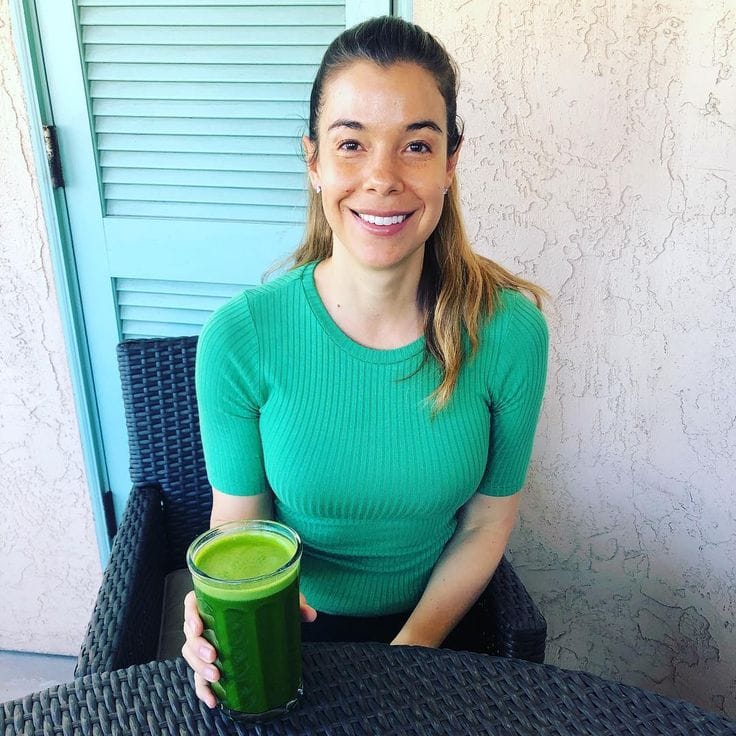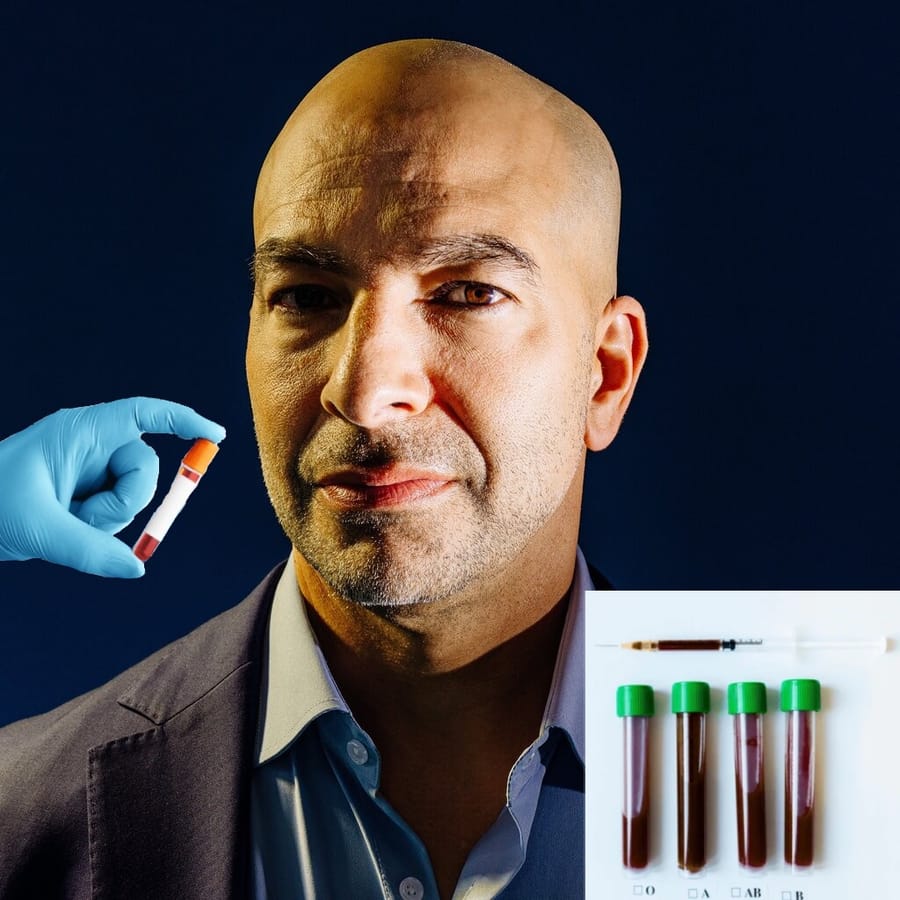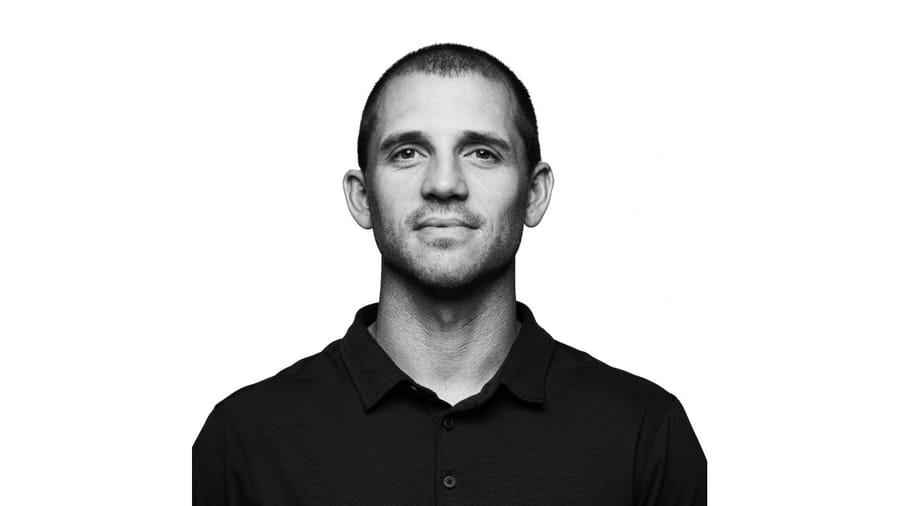Optimize longevity with Peter Attia's favorite science-backed supplement stack. Learn which brands and dosages he uses for a longer healthspan and improved performance.
Peter Attia's Supplement List
Peter Attia's Daily Supplements
- Omega-3 Fish Oil – 2.5g of EPA & 1g of DHA
- Peter’s Recommended Brands: Carlson, Nordic Naturals
- Vitamin D – ~5000IU’s (daily) as needed to hit blood levels of 40 – 60 ng/ml
- Magnesium –Various types
- Multivitamin / Green Powder – 1 scoop Ag1
- Peter’s Recommended Brands: AG1
- If prefer multivitamin: Thorne, Pure Encapsulations
- Probiotic -Pendulum Glucose Control (in morning)
- Peter’s Recommended Brands: Pendulum
- Protein Powder – Amount needed for protein goals
- Folate & Vitamin B12 – Daily
- Peter’s Recommended Brands: Jarrow
- Vitamin B6 – 50 mg / 3x per week
- Peter’s Recommended Brands: Thorne, Pure Encapsulations
- Baby Aspirin - Daily
- Peter’s Recommended Brands: Bayer
- Creatine - 5 grams daily
What Supplements does Peter Attia take for sleep?
- Glycine – 2 grams
- Peter’s Recommended Brands: Thorne, Life Extension
- Ashwagandha – 300 mg
- Peter’s Recommended Brands: Solgar, Pure Encapsulations, Jarrow,
- Magnesium L-Threonate – 100mg
- RX drugs: 50mg Trazadone & 100mg Pregabalin
What Supplements does Peter Attia take for Jet Lag?
- Melatonin - 1-3mg
- Phosphatidylserine - 400-600mg
Overview
Peter Attia is renowned as a longevity physician and has dedicated himself to exploring the means by which we can extend our lives while enhancing their quality. Much of his strategy for promoting longevity is encapsulated in his bestselling book Outlive: The Science & Art of Longevity. If you want to check out an in depth summary and review of the concepts in Outlive check out this article.
Today we are going to take a look Peter’s personal supplement regimen, aimed at bolstering health, longevity, and athletic performance
Attia emphasizes that supplements and vitamins are not substitutes for a healthy lifestyle or balanced diet. There's no panacea, no magical sequence of supplements that can optimize health and vitality without the foundation of sensible nutrition, regular exercise, and adequate restorative sleep.
Nevertheless, delving into the supplementation practices of experts like Peter Attia can offer valuable insights into potential benefits and available options for improving health or performance. Let's explore the daily regimen of Dr. Peter Attia, bearing in mind that consulting with a healthcare professional before incorporating any supplement is essential.
For transparency, the supplement links provided are affiliated with Amazon, with any income aimed at supporting further exploration and writing about supplements and health-related topics. Peter has expressed preferences for certain brands, including Thorne, Jarrow, , and Pure Encapsulations, which are reflected in the provided links. I have no affiliations with any brands or companies.
Omega-3 Fish Oil Capsules
Two fundamental Omega-3 fatty acids, EPA and DHA, play a vital role in promoting heart health and optimizing cholesterol levels. These fatty acids, abundant in sources like fatty fish such as salmon and select nuts, possess anti-inflammatory properties, elevate glutathione levels, and regulate cortisone levels.
Attia states he takes 4 capsules of 1200mg daily to aim for 2 grams of EPA and 1.5 grams of DHA. Attia prioritizes supplements with the highest EPA concentration available. This end goal with this dose is to achieve an Omega-3 Index of 12%, which is measurable via a blood test.
Peter’s Recommended Brands: Carlson, Nordic Naturals, Sports Research
Vitamin D
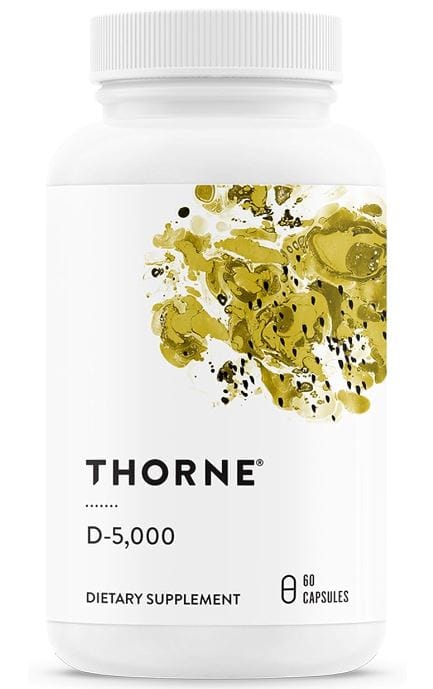
Attia underscores the minimal risk associated with vitamin D consumption, calling it "insanely low." Vitamin D plays a crucial role in facilitating calcium absorption, thereby fortifying bone density, and facilitates the uptake of phosphorus into the body. Additionally, it contributes to muscular strength and exhibits anti-inflammatory properties. Vitamin D is a misnomer as a name as this molecule is actually a steroid hormone rather than a vitamin.
While Attia advises adjusting vitamin D intake based on your situation he personally opts for a dosage of around 5,000 IUs per day. Ideally, this dosage should be determined based on individual blood test results and consideration of sunlight exposure. Personally, I take 5,000 IUs on days I am not getting sun to keep blood test levels between 40-60 ng/ml.
Peter’s Recommended Brands: Jarrow , Thorne
Magnesium
Magnesium: A Three-Pronged Approach
Peter Attia takes three different types of magnesium to target distinct physiological benefits, with an overall goal of consuming approximately roughly one gram of elemental magnesium per day - note that if taking all bioavailable forms you may need less elemental magnesium . He emphasizes that each variation is absorbed differently and affects the body in unique ways.
1. Poorly Absorbed Magnesium (For Bowel Regularity)
This category includes forms like magnesium oxide. While it is not efficiently absorbed into the bloodstream, it serves a specific purpose in digestive health. Attia leverages its poor absorption to help with bowel regularity.
- Dosage: He takes 400 to 500 milligrams of magnesium oxide daily.
- Peter’s Recommended Brand: PureGen
2. Well-Absorbed Magnesium (For Systemic Use & Electrolyte Balance)
For a more efficiently absorbed form that benefits the entire body, Attia turns to magnesium chloride. He specifically uses SlowMag tablets, noting that the chloride (salt) content enhances absorption. This form is particularly useful during his frequent fasts, as it helps replenish crucial electrolytes like potassium and sodium, which can mitigate muscle cramping.
- Dosage: He takes two or three SlowMag pills each day.
- Peter’s Recommended Brand: SlowMag
3. Brain-Absorbed Magnesium (For Cognitive & Sleep Support)
Finally, Attia incorporates magnesium L-threonate, a specialized form prized for its ability to cross the blood-brain barrier. Early research suggests this unique property allows it to more readily elevate magnesium levels in the brain. Once there, studies indicate it may help support cognitive function and improve sleep quality. Attia takes this portion of his magnesium stack before bed to capitalize on its sleep-enhancing benefits.
Athletic Greens / Multivitamin
Attia is transparent about his involvement with Athletic Greens, serving as both an advisor and investor in the superfood powder supplement company. He incorporates one scoop of AG1, the brand's flagship product, into his daily routine. AG1 is a green powder packed with over 75 nutrients, encompassing vitamins, minerals, probiotics, and digestive enzymes .
That green goodness doesn’t come cheap; it can start at $79 per month and notch up from there. Joking that he “knows how the sausage is made,” Attia believes AG1 has precisely what he needs, and adds a scoop of this to water daily.
For those who do not want to pay the premium for Athletic Greens this supplement is just a fancy multivitamin and replacing this with a quality multivitamin like ones below will cover same bases.
Recommended Brand: AG1
Peter’s Recommended Brands Multivitamin: Thorne, Pure Encapsulations
Glucose Control Probiotic
Attia takes two of these capsules each morning as the first thing he consumes. His trial of Glucose Control by Pendulum is a few months in, and he’s testing to see if the probiotic can help regulate his blood sugar levels when lab-tested.
Probiotics, generally, propagate a healthy gut microbiome, meaning your stomach inflammation is decreased. When you’ve got chronic gut inflammation, your body can become more resistant to insulin, the hormone that controls how your body processes sugar. This can, in theory, stave off diabetes.
Glucose Control is a pricey bottle, costing between $165 and $215 for 30 pills—meaning Attia’s two-capsules are running him around $10. It’s got an extra strain of probiotic bacteria in there (Akkermansia), which is noteworthy and thought responsible for this blood sugar modulation effects.
Brand: Pendulum Probiotics
They also make a less potent and less expensive version of this same probiotic made by the same company that can be found on Amazon
Protein Powders
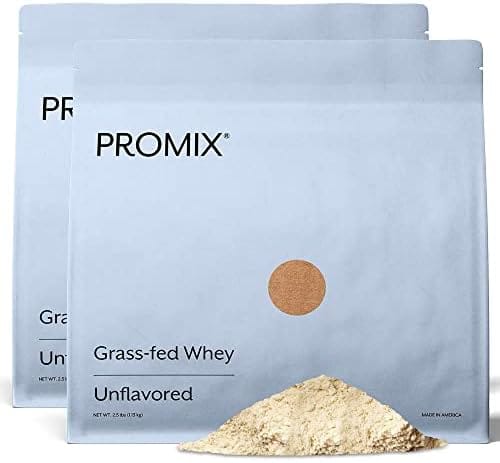
The aim, per Attia, is to ingest as much protein without overdoing the fat and carbohydrates. If you want to hear his exact approach, check out this AMA on his podcast where he talks about taking a blend of different protein powders. Peter said he combines 25 milligrams of flavored protein powder with 25 milligrams of unflavored protein powder to help reduce the sugars and calories.
Peter Attia mentions using the Promix brand of protein on his podcast. He notes looking for a quality whey isolate that doesn’t contain a significant amount of sucralose or other non-protein components. As for how much to take, that’s more a personal diet calculus but if you are aiming to increase muscle mass you want to aim for at least one gram of protein per pound of bodyweight.
Peter’s Recommended Brands: Promix, Thorne, Levels
Folate and Methylated B12
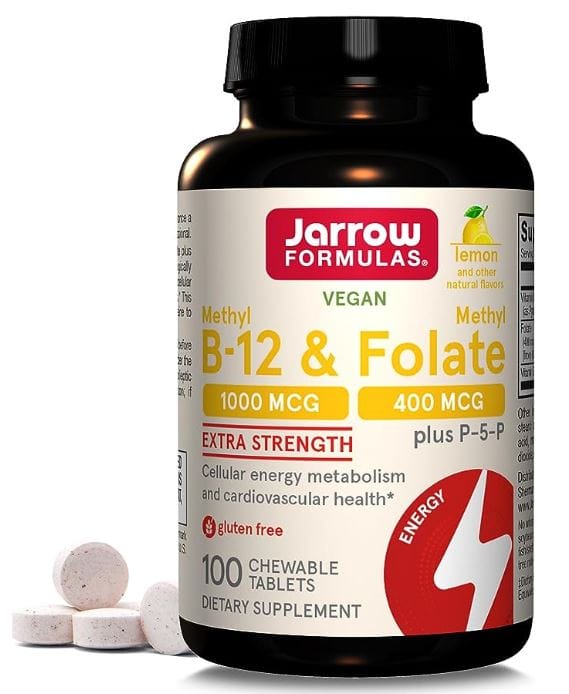
Our body needs folate to prevent heart disease. Naturally, folate or B9 can be found in the likes of leafy greens, peanuts, sunflower seeds, eggs, beans, and more. But if you’re not getting enough from your diet, it’s a solid idea to supplement with methylfolate. Methylfolate has an advantage in that it helps the folate enter the blood-brain barrier, and, once inside, it can help modulate the homocysteine amino, just like vitamin B6. Additionally, if you’re on antidepressants, methylfolate has been proven to elevate the efficacy of that SSRI.
Methylated B12 also positively affects our homocysteine, in addition to helping thwart anemia, in folks with B12 deficiencies. While we can extract B12 from foods—animal meats, yogurt, milk, etc—our ability to absorb correct amounts decreases as we age, so a supplement is often recommended. Methylated B12 is also easier on the kidneys, per Attia. Peter states he takes a Folate + B12 daily from Jarrow but I have also included a separate Methylfolate and Methylated B12 from Jarrow below for anyone interested.
Peter’s Recommended Brands: Folate + B12: Jarrow
Methylfolate: Jarrow
Methylated B12: Jarrow
Vitamin B6
Attia used to take vitamin B6 every day but has recently adjusted his regimen to three times per week. This change stems from concerns of excessive vitamin B6 causing nerve damage or neuropathy. Nonetheless, vitamin B6 offers notable benefits, particularly in promoting emotional well-being.
As Attia highlighted on a podcast episode, vitamin B6 plays a role in regulating homocysteine levels, crucial for mitigating risks associated with dementia, heart disease, and stroke, as outlined by the Cleveland Clinic. Moreover, vitamin B6 contributes to the synthesis of serotonin and other neurotransmitters, thereby enhancing mood and reducing symptoms of depression and anxiety, as evidenced by a 2022 study.
Attia now moderates his intake to 50 milligrams of B6, three times per week, to avoid excessive supplementation.
Peter’s Recommended Brands: Thorne, Pure Encapsulations
Baby Aspirin
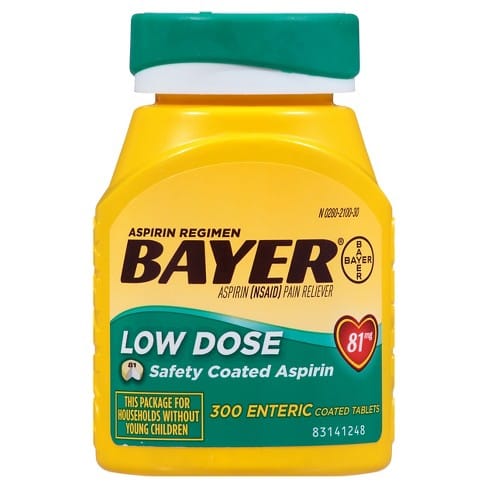
"I don’t believe there's a solid evidence-based rationale for my daily intake of baby aspirin," Attia states, even though he continues to take one daily. The efficacy of baby aspirin as a prophylactic is indeed subject to mixed research findings. However, it is unequivocally beneficial for individuals with a history of heart attack, stroke, or other cardiovascular diseases.
Aspirin's has blood-thinning properties, which can prevent clotting and heart-related issues but also elevate the risk of fatal bleeding so one must weigh this risk against possible reduction in ASCVD risk.
Attia’s closely monitoring the science around daily baby aspirin ingestion, saying “I’m always happy to reevaluate the use of this, and any supplement for that matter, in the presence of new data.”
Peter’s Recommended Brands: Bayer
Creatine
Peter mentions taking creatine daily on a recent Modern Wisdom podcast. Peter says he takes 5 grams of creatine monohydrate daily during his workouts. He does state timing doesn’t matter and this is just what works best for him.
Creatine has been extensively researched and is known for its ability to enhance athletic performance by increasing the availability of ATP, the primary energy currency of cells. This allows for improved performance during high-intensity, short-duration exercises such as weightlifting and sprinting. This effect results in creatine increasing muscle mass and strength in those who are actively training.
Beyond its performance benefits, creatine has also been studied for its neuroprotective properties. Recent research shows creatine may support brain health by improving mitochondrial function and energy production in brain cells. This can potentially enhance cognitive function and protect against neurodegenerative diseases.
Peter also mentions that loading high amounts of creatine is not needed and that sticking with around 5 grams daily is fine for most individuals.
Peter’s Recommended Brands: monohydrate from trusted brand like Thorne or Optimum
Sleep Helping Supplements
Supplements & Medications for Sleep Architecture
Sleep is a critical pillar of health, as outlined in Peter's book “Outlive.” He emphasizes that any improvements one can make to sleep can pay massive health dividends across all aspects of life. His personal approach is multi-faceted, utilizing a combination of supplements to promote relaxation and prescription medications to precisely target and improve specific phases of his sleep cycle, a strategy he developed based on his own detailed sleep study data.
- Glycine – 2 grams prior to sleep
- Ashwagandha – 300 mg prior to sleep
- Magnesium L-Threonate – 100mg prior to sleep (See magnesium section)
- RX drugs: 50mg Trazadone & 100mg Pregabalin
Glycine
Dosage: 2 grams prior to sleep
Details: Glycine is the smallest amino acid, essential for building proteins in your body and acting as an inhibitory neurotransmitter in the brainstem and spinal cord. It is thought to help calm the central nervous system, and early research shows possible benefits to overall cognitive function. In a notablestudy, 3 grams of glycine taken before bed helped people fall asleep more quickly and reduced the time it took to enter slow-wave or deep sleep.
- Peter’s Recommended Brands: Thorne, Life Extension (source)
Ashwagandha
Ashwagandha is an evergreen shrub with a long and storied history in traditional Ayurvedic medicine, where it is revered as a "Rasayana," or a rejuvenating tonic. Classified as an adaptogen, it is believed to help the body become more resilient to physical and mental stress. Peter Attia takes 300 mg of ashwagandha in the evening to help improve his sleep quality.
While he notes that the data on its direct impact on sleep architecture isn't overwhelmingly robust, he has found both subjective and objective benefits. The primary mechanism of action is thought to be its ability to modulate the hypothalamic-pituitary-adrenal (HPA) axis, the body's central stress response system. By buffering the release of cortisol, the primary stress hormone, ashwagandha can promote a state of calm, making it easier for the body to relax and prepare for rest.
Recent research continues to support its use for stress, with multiple human studies demonstrating that daily supplementation can significantly reduce perceived stress and anxiety levels, as well as lower serum cortisol.
Understanding the Extracts: Not All Ashwagandha is Created Equal
When choosing an ashwagandha supplement, it's crucial to understand that the beneficial effects come from a group of active compounds called withanolides. The concentration and composition of these withanolides can vary dramatically depending on the part of the plant used (root vs. leaves) and the extraction process. This has led to the development of patented, standardized extracts to ensure consistent potency and reproducible results.
Ashwagandha Extracts: A Detailed Comparison
| Feature | KSM-66® | Sensoril® | Shoden® |
|---|---|---|---|
| Plant Part Used | Root only | Root and leaves | Root and leaves |
| Standardization | 5% Withanolides | ≥10% Withanolides | 35% Withanolides |
| Key Characteristics | The most clinically studied extract, follows the traditional Ayurvedic use of only the root. Often associated with a balance of calming and energizing effects. | Higher withanolide concentration than KSM-66. Its use of leaves makes it distinct. Often marketed for its potent stress-reducing and sedating properties. | The highest concentration of withanolides, purported to have superior bioavailability and a longer half-life in the body, remaining active for over 24 hours. |
| Common Use Case | General stress, cognitive function, athletic performance, and sleep. | Primarily focused on stress, anxiety, and sleep improvement. | High-potency applications for significant stress support and where bioavailability is a key concern. |
Why the Difference Matters:
- Root vs. Leaves: Traditional Ayurvedic practice primarily uses the ashwagandha root. Proponents of root-only extracts like KSM-66 argue this is the time-tested method and that leaves may contain higher levels of Withaferin A, a cytotoxic withanolide that is less desirable in a daily supplement.
- Withanolide Concentration: A higher percentage, as seen in Sensoril and especially Shoden, means you can take a smaller dose to get a significant amount of the active compounds. However, the specific blend and ratio of the different types of withanolides also play a critical role in the extract's ultimate effect.
While Peter has mentioned using the Solgar brand, which uses a whole root powder, consumers interested in the most researched forms will often look for products specifically featuring the KSM-66 or Sensoril logos on the label.
Safety and Brands
Ashwagandha is generally considered safe for short-term use (up to 3 months), with mild side effects like drowsiness or stomach upset being uncommon. However, due to its effects on the immune system and hormone levels, individuals with autoimmune conditions (e.g., rheumatoid arthritis, lupus), thyroid disorders, or hormone-sensitive prostate cancer should consult their physician before use. It should also be avoided during pregnancy.
- Peter’s Recommended Brands: Solgar, Pure Encapsulations, Jarrow
- Brands Using Standardized Extracts:
- KSM-66: Jarrow, Natural Factors
- Sensoril: Life Extension
Prescription Medications for Sleep Optimization
🚨 CRITICAL DISCLAIMER: The following section discusses prescription medications. You must consult with a qualified physician before considering any prescription medication for sleep.
Pregabalin
- Dosage: 100 mg
- Purpose: Peter uses Pregabalin to specifically target and increase his amount of non-REM deep sleep (Stage 3 sleep). After his sleep studies revealed he was deficient in this critical restorative phase, he incorporated this medication to address that specific architectural weakness.
Trazodone
- Dosage: 50 mg
- Purpose: Peter takes a low dose of Trazodone to help reduce the number of nighttime awakenings. Its sedative properties help him maintain more consolidated sleep throughout the night, preventing disruptions that can fragment sleep architecture and reduce its overall quality.
Supplements Peter Uses for Jet Jag
Lastly we’ll cover supplements Peter takes for combatting jet lag. He does not use these regularly but finds these helpful when adjusting to a new sleep schedule from traveling.
Melatonin
Peter does not take Melatonin for sleep in general as it can disrupt sleep architecture. He does use it for helping with jet lag when he knows his sleep probably will be disrupted regardless.
He mentions taking 1-3mg on a plane or the first night in a new time zone to help the body start to adjust its internal clock.
Peter’s Recommended Brands: Life Extension, Thorne
Phosphatidylserine
Phosphatidylserine is a phospholipid compound found in the brain with a crucial role in nerve cell communication, cell membrane structure, and memory function. Peter says this substance is very potent at reducing cortisol levels and helping with sleep. He only uses it when necessary due to its ability to shut down adrenals.
Peter will take 400 to 600 mg of phosphatidylserine
Peter’s Recommended Brands: Jarrow, Thorne



